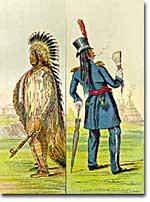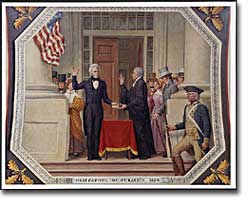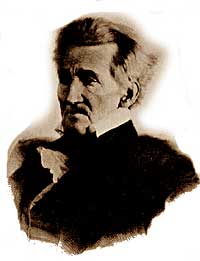
24. The Age of Jackson

American painter George Catlin documented the disappearing tribes of the upper Missouri River. This double portrait of an Assiniboin named Wi-jun-jon (who was also know as Pigeon's Egg Head and The Light) was made in 1832.
At Andrew Jackson's 1828 inauguration, hundreds of bearded, buckskin-clad frontiersmen trashed the White House while celebrating the election of one of their own to the Presidency. Though born in South Carolina, Jackson, like many others, had moved to the frontier. Indeed, America was a country on the move west.
On July 4, 1826, less than two years before "King Andrew" ascended to the "throne," the Yankee John Adams and the aristocratic Virginian Thomas Jefferson both passed away. America's Revolutionary generation was gone. With them went the last vestiges of the Federalist and Democratic-Republican parties. This helped to bring about a new balance of political power, and with it two new political parties. The 1828 election was portrayed by Jackson's Democrats as proof of the "common people's right" to pick a President. No longer were Virginia Presidents and northern money-men calling the shots. Class systems were breaking down. To that end, some states had recently abolished property requirements for voting. These poorer folk supported General Jackson.

Andrew Jackson was the first president to be sworn into office on the East Portico of the Capitol. This painting shows the oath of office being administered by Chief Justice John Marshall.
Jackson's strong personality and controversial ways incited the development of an opposition party, the Whigs. Their name echoes British history. In Great Britain, the Whigs were the party opposed to a strong monarch. By calling themselves Whigs, Jackson's enemies labeled him a king. And they held firm in their opposition to "King Andrew" and his hated policies.
Sectional rivalries bubbled to the surface as the Era of Good Feelings slipped into history. The South began feeling more and more resentful of the influential manufacturers of the North. The South's resentment came to an ugly head in the nullification battle of the early 1830s in which South Carolina considered leaving the Union because it disagreed with a federal law. The Second Bank of the United States was seen by westerners and southerners as a tool to make northerners and easterners rich at the expense of the rest of the country. Through force of personality, Jackson got his way in the nullification battle and triumphed again when he vetoed the charter of the national bank. These regional rifts would only get worse over time.

Genocidal racist or man of the people? Andrew Jackson's legacy inspires strong feelings, but his actions often reflect the times in which he lived.
Finally, the westward movement was not only reserved for pioneers. Native Americans were moving west as well — and not because they wanted to. Andrew Jackson had initiated an Indian removal policy that forced all natives to relocate west of the Mississippi River. Indian lands were open to settlers and land speculators. Thus began another sad chapter in the federal government's dealings with Native Americans.
The Jacksonian Era was nothing short of another American Revolution. By 1850, the "common man" demanded his place in politics, the office of the president was invigorated, and the frontier exerted its ever more powerful impact on the American scene. Hated by many, but loved by many more, Andrew Jackson embodied this new American character.





